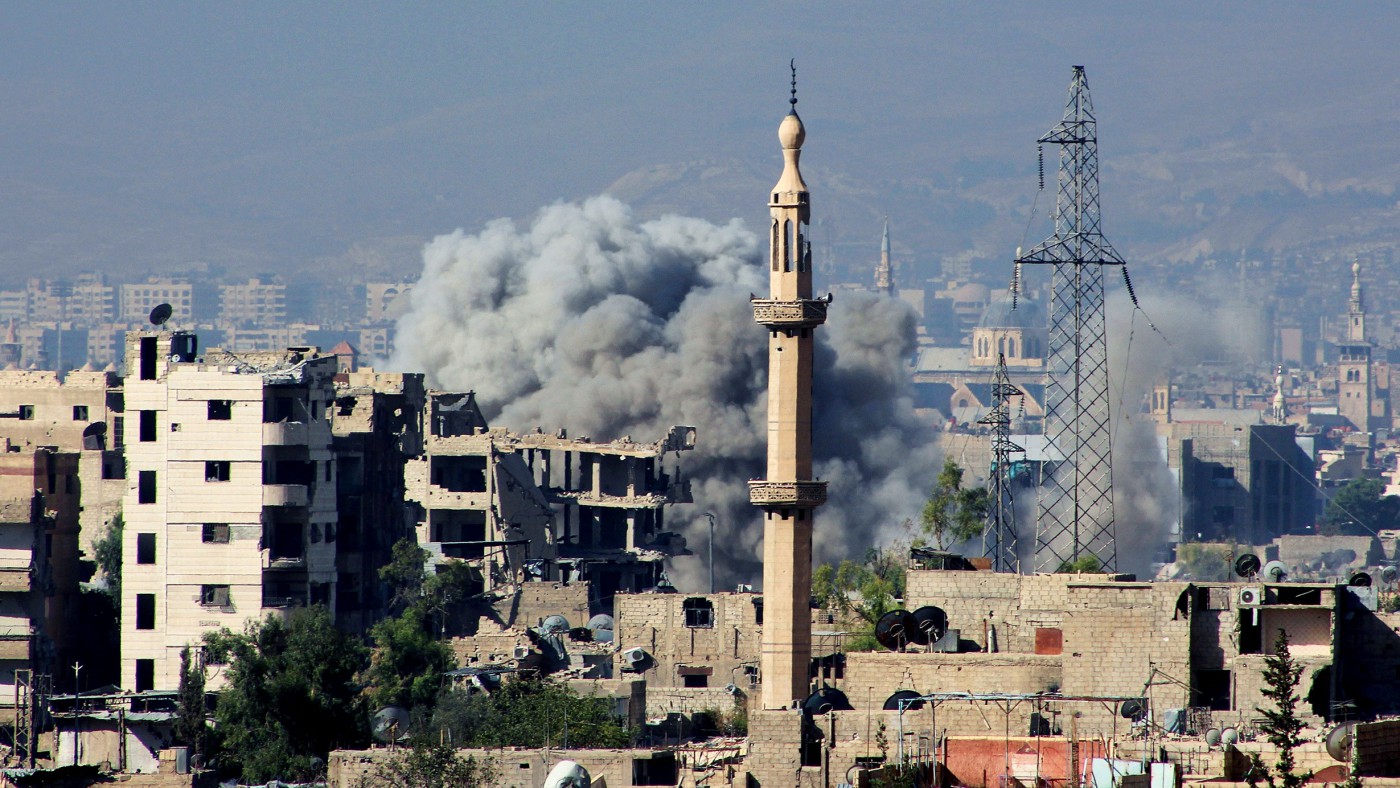The only surprising aspect of Russia’s military intervention in Syria is that anyone in the West should be in the least bit surprised that Russian President Vladimir Putin has embarked on this dramatic initiative.
Ever since the turn of the last century and the collapse of the Ottoman Empire, the Russians have case covetous eyes over the desert sands of Arabia. Following the formation of the Soviet Union, Moscow’s desire to acquire influence in the region became something of an obsession at the Kremlin, which was driven as much by its desire to gain access to the region’s oil riches as to keep American expansionism in check.
This was the era of the Eisenhower Doctrine, whereby Washington explicitly committed itself to support any Middle Eastern country that faced armed aggression from another state – i.e. the Soviet Union. By way of retaliation, Moscow intensified its efforts to build alliances in the region, leading it to attempt a serious of disastrous courtships with the region’s dictators, from Egypt’s President Gamal Nasser in the late 1950s to Iraqi President Saddam Hussein in the 1980s.
But, with one notable exception, the majority of these Russian overtures came to nothing, not least because these local, home-grown dictatorial regimes resisted coming under the yoke of an even greater autocratic entity.
The exception, of course, was Syria, where the virulent anti-Israeli rhetoric espoused by President Hafez al-Assad, the founding father of Syria’s Ba’athist dictatorship, instantly won admirers in the Kremlin, which was committed to do everything its power to destabilise the Jewish state, America’s most important regional ally.
Thus was born a strategic partnership between Moscow and Damascus that has lasted for more than four decades, and resulted in Russia establishing two vital military bases along the Syrian littoral, a naval base at Tartus and an air base at Latakia, which also doubles as Moscow’s GCHQ-style listening base for the rest of the Arab world.
From the outset of Syria’s civil war more than four years ago, Mr Putin made it abundantly clear that Moscow would not abandon its ally after the regime of Bashar al-Assad, the son of the former Ba’athist dictator, was threatened by Western-backed opposition forces. During the early stages of the conflict, when the opposition was led by moderate secularists, Mr Putin’s main tactic was to block any diplomatic efforts to negotiate a peace deal during the Geneva talks.
But now the most effective elements in the opposition are hard-line Sunni Muslim Islamist groups, such as Islamic State in Iraq and the Levant (Isil) and the Saudi-backed Nusra Front, Mr Putin has been forced to adopt a more robust approach to preserving Russia’s key ally in the region in power.
The turning point for Moscow came in the summer when Mr Assad conceded in a speech in Damascus in July that forces loyal to the regime were losing ground against the Islamist-led onslaught. This led Iran, another key backer of the Syrian regime, to lobby Russia to provide military backing to Damascus. Otherwise, it warned, Moscow could wave goodbye to its long-standing military bases in the eastern Mediterranean.
The Iranian warning certainly had a salutary effect on the Kremlin, with the result that within weeks of the Iranian warning Moscow had dispatched two combat squadrons of aircraft to Latakia, as well as making arms shipments to Assad loyalists. The latest reports from Syria suggest the Iranians are now deploying thousands of their troops to Damascus in preparation for a joint offensive with the Russians against Islamist positions.
No one doubts that Mr Putin’s intervention in the Syrian conflict has had a dramatic impact on the course of the conflict. The repeated Russian air strikes appear to have halted the relentless Islamist-led advance on Damascus, while saving the Assad regime from imminent collapse.
Mr Putin will also be calculating that, at a time when the Obama administration appears determined to abandon Washington’s historic ties in the region, Moscow’s muscular demonstration of support for its ally will send a message to other regimes in the region that Russia, unlike the Americans, can be relied upon in a crisis.
If that is the case, then he is likely to be sorely disappointed, not least because, by supporting the Assad regime, Russia has placed itself on the wrong side of the increasingly bitter divide between Sunni and Shia Muslims in the Arab world.
Tensions between leading Sunni states such as Turkey, Saudi Arabia and Egypt have been exacerbated in the wake of last summer’s deal with Iran, the region’s Shia superpower, over its nuclear programme.
Far from allaying fears about Iran’s nuclear ambitions, the deal has convinced many Sunni powers that Washington is not serious about preventing the ayatollahs from acquiring nuclear weapons. Furthermore, they fear the estimated $150 billion Iran will receive when its frozen assets are released as part of the nuclear deal next year will be used to finance its attempts to extend its influence further throughout the region.
Iranian officials now openly boast that their Shia forces have already captured four Sunni Arab capitals – Sana’a, Baghdad, Damascus and Beirut: the Saudis have responded by saying they will not rest until all four are back under Sunni suzerainty.
By authorising Russia’s military intervention in Syria, Mr Putin has not only placed Moscow in direct conflict with Sunni Islam: he could also see Russia lose vital economic interests in the region.
For example, Turkey has been so angered by Russian incursions into its air space that the country’s president, Tayyip Erdogan, earlier this week threatened to cancel a multi-billion dollar deal for Russia to build four nuclear power stations.
For all the bravura Mr Putin has displayed since Russia first deployed its military forces to Syria, the Russian president may yet come to regret bitterly his bold Arabian gamble.


